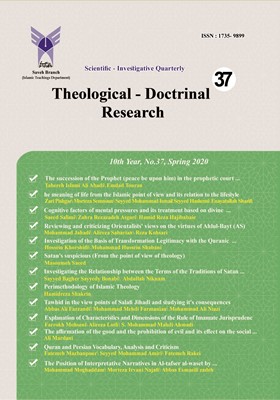The affirmation of the good and the prohibition of evil and its effect on the social health of society in Islamic teachings With emphasis on verses and narrations
Subject Areas : کلام اسلامی
1 - University of Tehran
Keywords: social health, people', s supervision, community, amre – be-maroof, nahie – az – monkar,
Abstract :
Nowadays, despite the many advances in scientific fields, we are endangering the health of the soul and body due to the lack of reliance on divine teachings in the crisis. Hence, the path to salvation of the return to Islamic teachings. The present paper, by analytical method, describes with a library study the explanation of one of the important teachings of Islam in the name of oversight through the guise of good and forbidding evil and its impact on the health of the community. saving society from crises and providing community health in the light of clarifying the status of the affair with the good and forbidding it to be void and enforcing; the implementation of these two terms is a proven solution for the health of the community; whenever a person is cultivating and self-cultivating Step through internal control; t will have a significant impact on the organization of society, because avoiding sin and paying attention to positive human and practical points is an appropriate field for developing capacity and reform; Islam and its enormous effects on environmental health are evidence of the truth of this claim; Part of the mission of Hassbah's institution is in the form of good and forbidding at the beginning of Islam, monitoring food markets and health, covering meat and dairy products in the market and public places, and the other part is related to the protection of value Ethical and moral virtues in the community and prevent the commission of secrecy, insecurity and moral corruption; The practice of this promise means the friendship, the affection and the interest in the fate of others, and the negation of indifference, and ultimately, the mental and emotional peace of this empathy, which humanity today needs more than anything else..
قران کریم.
نهج البلاغه.
امر به معروف و نهى از منكر(1376)؛ نمايندگى ولى فقيه در سپاه. مركز تحقيقات اسلامى سپاه.
ابویی مهریزی، حسین(1386)؛ نقش امر به معروف و نهی از منکر سلامت محیط، ویژه نامه اولین همایش بهداشت در آموزه¬های پیامبر اعظم، مجله دانشگاه علوم پزشکی رفسنجان، دوره ششم، 23-30.
خوش فر، غلامرضا؛ محمدی، آرزو؛ محمدزاده، فاطمه؛ محمدی، راضیه و اکبرزاده، فاطمه (1394)؛ امنیت اجتماعی و سلامت اجتماعی (مطالعه موردی جوانان 29-15 شهر قاین)، مجله مطالعات اجتماعی ایران، دوره نهم، شماره 1، 71-102.
جوادی آملی، عبدالله (1385)؛ نظارت عمومی، امر به معروف ونهی از منکر از عوامل پیشرفت، مجله پاسدار اسلام.
جوان آراسته، حسین (1384)؛ حقوق اجتماعی و سیاسی در اسلام. قم: دفتر نشر معارف.
جرجانی، میرسید شریف (1368)؛ التعریفات.تهران: انتشارات ناصرخسرو.
حاتمی، پریسا(1389)؛ بررسی عوامل موثر بر سلامت اجتماعی دانشجویان با تأکید بر شبکه¬های اجتماعی، پایان نامه کارشناسی ارشد، رشته مددکاری اجتماعی، دانشگاه علامه طباطبایی.
حرعاملی، محمدبن حسن( 1409)؛ وسایل الشیعه الی تحصیل مسائل الشریعه.قم: مؤسسه آل البیت.
سجادی، حمیرا و صدرالسادات، سیدجلال(1383)؛ شاخص¬های سلامت اجتماعی، اطلاعات سیاسی- اقتصادی، شماره 207، 244- 253.
رازي، ابوالفتوح(1334)؛ تفسیر روض الجنان و روح الجنان. قم: نشراسلامی.
راغب، الاصفهاني(1424هـ ق)؛ مفردات الفاظ القرآن. تحقيق صفوان عدنان داودى. قم: انتشارات ذوى القربى، چاپ سوم
شهیدثانی، زین الدین بن علی(1383)؛ فقه استدلالی (ترجمه تحریرالروضه فی شرح المعه)، مهدی دادمرزی، تهران: کتاب طه، چاپ هفتم.
طبرسى، ابوعلی، فضل بن حسن.(1415)؛ مجمع البیان فى تفسیر القرآن.بیروت:مؤسسه الاعلمى للمطبوعات.
طریحی، فخرالدین ( 1416ق )؛ مجمع البحرین. تهران: کتاب فروشی مرتضوی.
علیوردی¬نیا، اکبر و شارع¬پور، محمود و ورمزیار، مهدی(1387)؛سرمایه اجتماعی خانواده و بزهکاری، پژوهش زنان، دوره 6، شماره 2: 132-107.
قاضی شریعت پناهی، سید ابوالفضل (1383)؛ حقوق اساسی و نهادهای سیاسی. تهران: میزان، چاپ دوازدهم.
قرائتی، محسن (1379)؛ امر به معروف و نهی از منکر، تهران: مرکز فرهنگی درس¬هایی از قران.
مکارم شیرازی ،ناصر (1370)؛ پیام قرآن. قم: موسسه مطبوعاتی هدف.
مسعودی،محمداسحاق.(1380). پژوهشی در امر به معروف ونهی ازمنکر ازدیگاه قرآن وروایات. تهران: موسسه انتشارات امیرکبیر.
مردانی، علی؛ آیتی، سید محمدرضا و نقیبی، سید ابوالقاسم؛ عوامل بی¬تفاوتی نسبت به امر به معروف و نهی از منکر، فصلنامه علمی پژوهشی علوم اجتماعی، دوره 11، ویژه نامه پیشگیری از جرم و حقوق، زمستان 1396.
موسوي خميني. روح اله.(1389). صحيفه نور. تهران: مؤسسه نشرو تنظیم آثارامام خمینی.

